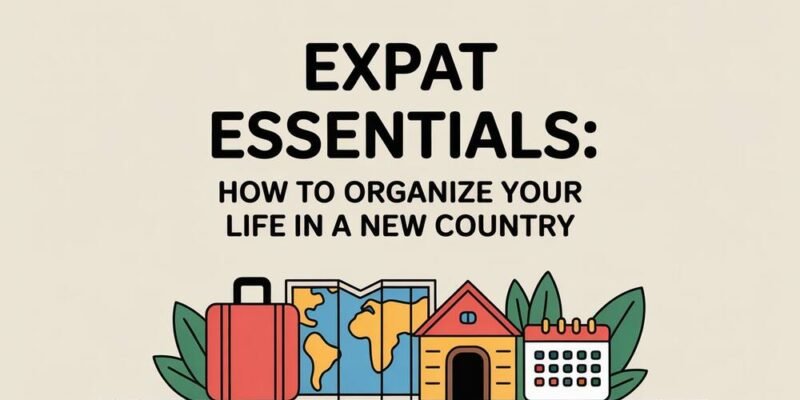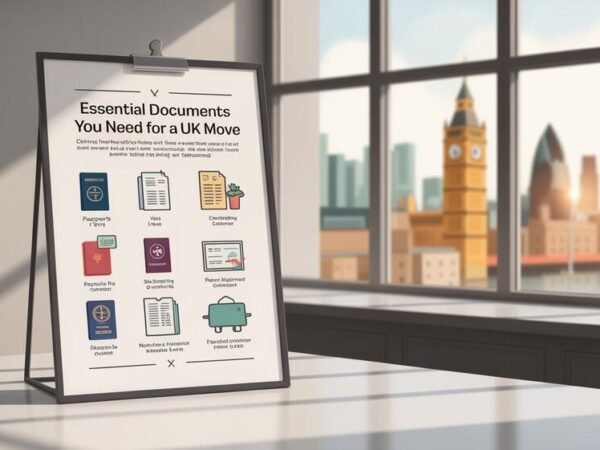Moving to a new country as an expatriate can be an exciting yet overwhelming experience. The thrill of discovering new cultures, languages, and landscapes is often tempered by the logistical challenges of setting up a life abroad. Staying organized is one of the most critical aspects of successfully transitioning to a new environment. With careful planning and thoughtful strategies, you can simplify the relocation process and confidently settle into your new home. Here’s how to organize your life as an expat.
Start with the Basics: Housing and Legal Documents
Before getting comfortable in your new country, you must ensure your housing situation is sorted, and your legal documents are in order. This includes:
- Finding a Place to Live: Whether renting or buying, securing accommodation that suits your needs is crucial. Research neighborhoods, understand local rental laws, and connect with real estate agents if necessary. Tools like property websites and local expat forums can offer helpful insights.
- Legal Documentation: Make sure all your legal documents are ready and current. This includes your passport, visa, and work permit documents. Research the local immigration laws, as each country has different requirements for expats. Consider keeping digital and physical copies of these documents to avoid issues later.
Create a System for Finances and Taxes
Managing your finances in a new country requires a little extra planning. You must familiarize yourself with the local currency, banking systems, and tax laws. Here’s how to stay on top of your financial life as an expat:
- Set Up a Local Bank Account: Open a local bank account as soon as possible to avoid high international fees and streamline payments for rent, utilities, and daily expenses. Ensure your bank provides services in English, if needed, and offers online banking for easy management.
- Budget and Currency Exchange: Track your spending by creating a budget and factoring in your local and international expenses. Be aware of currency exchange rates and the costs of transferring money between countries. Apps like Revolut or Wise can help you manage your funds across borders.
- Understand Taxes: Research the tax laws in your host country, as you may still be liable to pay taxes in your home country. Some countries have tax treaties that can help avoid double taxation. Consulting a tax advisor who specializes in expat finances is a smart move.
Stay Organized with Household Items and Utilities
When moving abroad, setting up your new home and ensuring all utilities are connected can be one of the more time-consuming tasks. Here’s how to keep it organized:
- Create a Moving Checklist: Make a comprehensive checklist of everything you need to do before, during, and after your move. This includes contacting utility companies (electricity, water, gas, internet), arranging furniture, and purchasing any household items you need. Ensure you understand the installation processes for utilities, as each country has different systems.
- Organize Your Belongings: If you’re shipping items from your home country, clearly create a detailed inventory list and label boxes. This will help you keep track of your belongings and make the unpacking process smoother. When purchasing new items, consider organizing them by category (e.g., kitchenware, electronics, bedding) so they’re easy to find when needed.
Stay Connected: Communication and Social Integration
One of the key challenges of being an expat is maintaining communication with friends, family, and locals while also integrating into the community. Here are some ways to stay connected:
- Set Up Communication Tools: Ensure you have reliable communication tools, such as an international phone plan, local SIM card, or Wi-Fi connection. Messaging apps like WhatsApp, Skype, or Zoom are essential for keeping in touch with loved ones back home.
- Learn the Local Language: Even if the language barrier is minimal, learning the local language is beneficial. This will help you integrate into the community more easily, find work, and build friendships. Many cities offer language courses for expats, and apps like Duolingo or Babbel can help you practice on the go.
- Join Expat Communities: Being part of local expat groups can be incredibly helpful. They offer valuable advice, social meetups, and sometimes even job opportunities. You can find expat communities on social media platforms, through local organizations, or even at events specifically designed for newcomers.
Work-Life Balance and Networking
Your job will likely be a big part of your expat life. Staying organized in your professional life is key to ensuring a smooth transition:
- Understand Your Work Rights: Research your new country’s labor laws and employment rights. This includes contract types, working hours, and vacation days. Knowing your rights helps prevent any legal issues with your employer.
- Build a Professional Network: Attend local networking events and join professional groups in your industry. LinkedIn can also be a helpful tool for connecting with other professionals in your new city.
Keep a Positive Mindset
While staying organized is essential, don’t forget to take care of your emotional health. Moving abroad can be stressful, and it’s necessary to maintain a positive mindset. Explore your new surroundings, try new activities, and embrace your new life. Creating a routine that includes socializing, hobbies, and relaxation can make the transition smoother and more enjoyable.
In Conclusion
Organizing your life as an expat involves balancing strategic planning with adaptability. There’s a lot to manage, from securing housing and understanding local regulations to managing your finances and integrating into the community. However, you can build a fulfilling and successful life in your new country with thoughtful organization and a proactive mindset. One key tip is to create an “Important Documents” folder to keep track of essential paperwork like your passport, visa, and rental agreements documents for easy access. Embrace this adventure, knowing each step is an opportunity to grow, learn, and thrive in this exciting new chapter of your life.
Do Read: How Fast Immigration Processing Impacts Startup Growth in the United States













